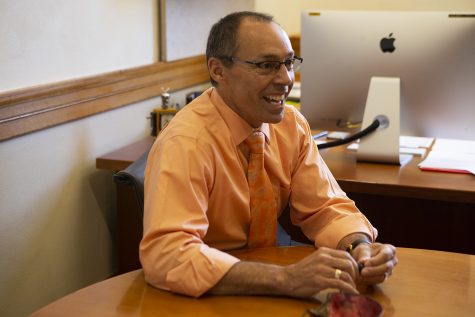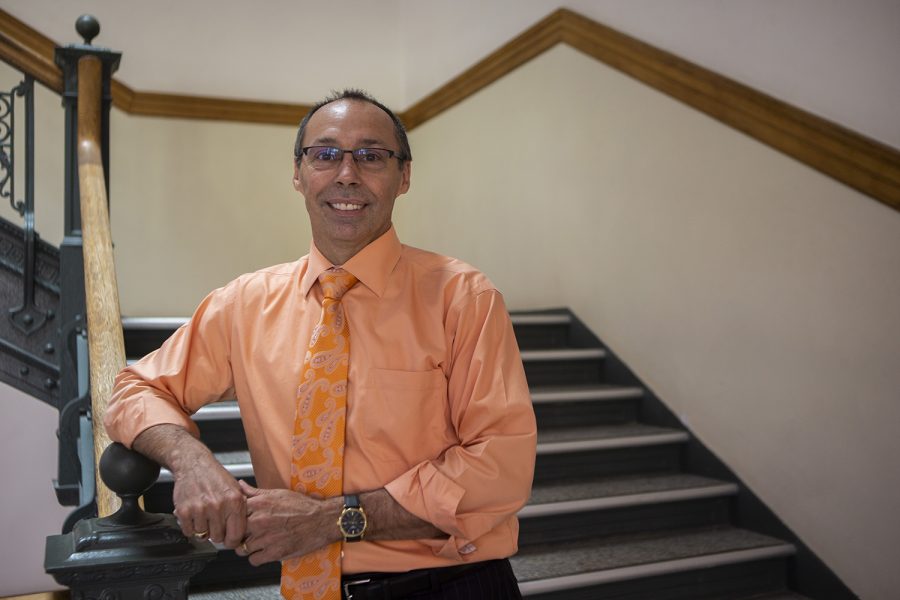Plans of excellence, impact, autonomy, and accountability drive new CLAS dean as fall semester begins
As the new CLAS dean, Steve Goddard, heads into the fall semester, he looks to drive departmental success and decentralize power.
New CLAS Dean Steve Goddard poses for a portrait in Schaeffer Hall on Friday, August 23, 2019.
August 26, 2019
College of Liberal Arts and Sciences Dean Steven Goddard is enthusiastic to begin work this school year as he settles into his new position at the University of Iowa.
Goddard assumed the role of liberal-arts dean on June 1, succeeding the interim dean Joseph Kearney, who filled the role after Chaden Djalali became Ohio University provost in 2018. Goddard said he is thrilled to be at a university where research and teaching are equally valued.
“We are developing new knowledge and sharing and training a future generation of scientists, artists, and scholars,” Goddard said.
Related: Goddard holds forum as third dean candidate for College of Liberal Arts & Sciences position
Before coming to the UI, Goddard worked at the University of Nebraska-Lincoln as a professor of computer science and engineering, chair in the computer science and engineering department, interim dean in the College of Arts and Sciences, and the vice chancellor of research.
It was his extensive experience that contributed to his selection as the new liberal-arts dean, said selection committee co-chairs Sarah Gardial, Tippie College of Business dean and David Ryfe, School of Journalism and Mass Communications director.
Goddard defined two areas that he wants to focus on as the liberal-arts dean. The first is to maintain greatness in existing areas and identify areas that can become great.
“We can’t do everything. We’re the University of Iowa, we’re good at a lot of things,” Goddard said. “But I want us to be great at some things.”
The second goal Goddard hopes to achieve as dean is to decentralize power and decision making from the college level to the department level through autonomy and accountability.

New CLAS Dean Steve Goddard sits for an interview in his office in Schaeffer Hall on Friday, August 23, 2019.
“We had centralized a number of decision making and operations at the college level, so we could better absorb cuts from the state legislature,” Goddard said. “Now I want to move back toward departments being more innovative.”
Ryfe agrees that the current structure of power is no longer the most effective and said it is difficult to process all the transactions and decisions at the college level. Gardial also emphasized her excitement and that such change is integral to the future of the college.
“The future is going to look differently and is going to need to be led differently,” she said.
Gardial said she has never seen anyone jump in and engage as quickly as Goddard has.
“We have a very collaborative group,” Gardial said. “[Goddard] came in the door talking about the need for collaboration.”
Gardial and Ryfe said they have found that Goddard is a perfect fit for the UI, as his values and attitudes are exactly what the UI needs.
“[Goddard] had multiple leadership positions at his previous institution,” Gardial said. “He knew campuses very well and had approached them from very different perspectives.”
Ryfe highlighted the importance of enthusiasm in a leader and commented on his involvement in the liberal-arts departments thus far. Goddard has visited each unit for beneficial, one-on-one conversations, he said.
“These are difficult times in higher education,” Ryfe said. “It helps when your leader is sending out energy that is positive and optimistic. [Goddard] is learning as much as he can about each individual unit and their culture.”



